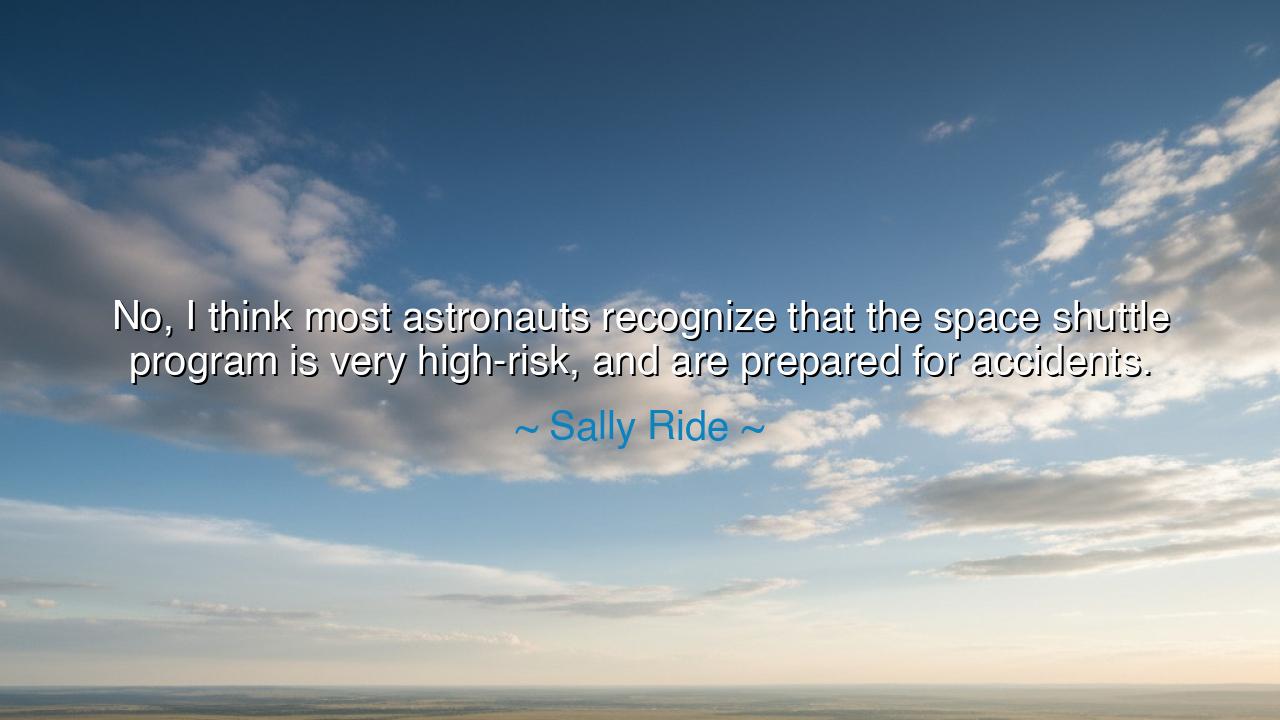
No, I think most astronauts recognize that the space shuttle
No, I think most astronauts recognize that the space shuttle program is very high-risk, and are prepared for accidents.






Hear the solemn words of Sally Ride, the first American woman to journey into the stars, who declared: “No, I think most astronauts recognize that the space shuttle program is very high-risk, and are prepared for accidents.” These words are not the trembling of fear, but the calm resolve of one who has looked into the abyss of danger and chosen still to step forward. In them lies the ancient truth that great endeavors cannot be divorced from peril, and that courage is not the absence of risk, but the readiness to face it with open eyes.
The origin of this wisdom lies in the very nature of spaceflight. From the earliest launches, men and women who donned the astronaut’s suit knew that the heavens are not conquered without cost. The space shuttle program, though a marvel of engineering, was fraught with uncertainty: millions of parts working as one, each capable of failure. Sally Ride, as one who flew aboard Challenger, understood intimately that every ascent was a wager between human ambition and the unforgiving laws of nature. Yet she and her comrades did not turn back, for the pursuit of knowledge and exploration was worth the risk.
History itself confirms her words. Think of the tragedy of the Challenger disaster in 1986, when the shuttle broke apart mere minutes after launch, taking seven souls into eternity. The world watched in horror, yet those who perished had boarded that craft fully aware of the danger. They were not reckless, but prepared. They had accepted that accidents were not only possible, but inevitable in such a high calling. Sally Ride, who later served on the commission that investigated the tragedy, spoke with authority: astronauts walk willingly into danger because their spirit values discovery above safety.
So too with the ancient explorers of the earth. Consider the voyages of Magellan, who set forth to circumnavigate the globe. Many of his crew died, and he himself never returned. Yet he embarked, prepared for accident and peril, because to see the unknown and chart it for humanity was worth more than life itself. The spirit of the astronaut is the same spirit of the mariner: a willingness to risk all in the service of opening new horizons for those who will follow.
Sally Ride’s words also speak to the nature of courage itself. True courage is not blind bravado, nor denial of danger. It is recognition of the risk, the sober acknowledgment that accidents may come, and the steadfast decision to proceed nonetheless. The astronaut who boards the shuttle does so not in ignorance, but in strength. And this is a lesson for all: in our own lives, whether in ventures of the spirit, of love, or of work, we must sometimes step forward though the path is fraught with peril. For no great achievement is born without danger.
The lesson for us is clear: do not wait for perfect safety before you dare. The world is uncertain, life itself precarious. To live meaningfully is to be prepared for accidents—to embrace the risk of failure, loss, or pain, knowing that the pursuit is greater than the fear. The astronaut prepares for accidents; the artist prepares for rejection; the leader prepares for resistance. Yet they move forward, for their calling demands it.
Therefore, O listener, let Sally Ride’s wisdom be a guide to you. Whatever your endeavor, count the cost, acknowledge the danger, and then go forward with steady heart. Do not be paralyzed by the high-risk nature of life’s shuttle, for only those who dare to launch will ever glimpse the stars. And when accidents come—as they surely will—let them not be the end of your spirit, but a testimony to the courage with which you lived. For the heavens belong not to the cautious, but to the brave.






AAdministratorAdministrator
Welcome, honored guests. Please leave a comment, we will respond soon